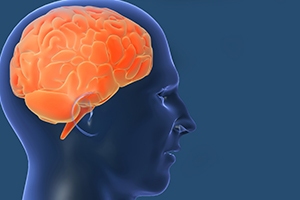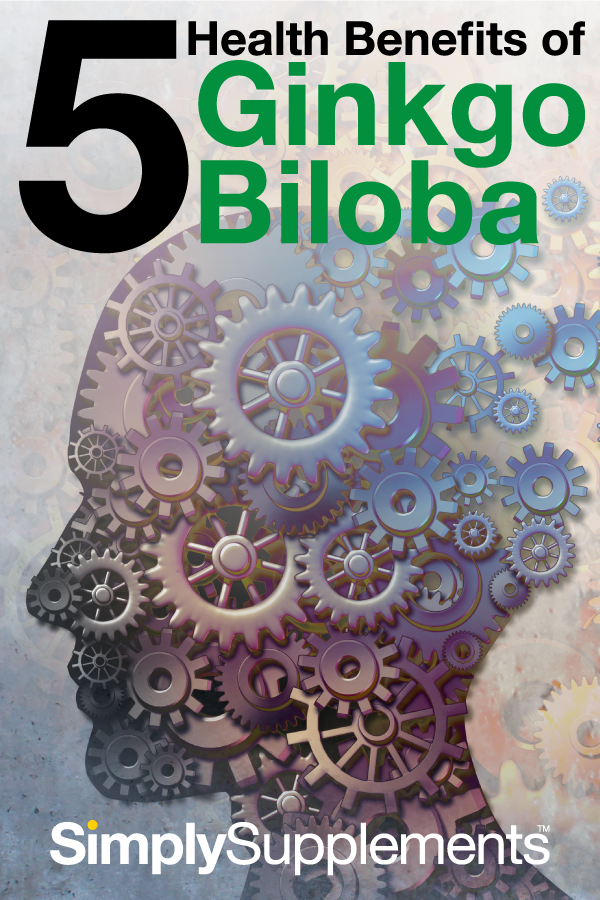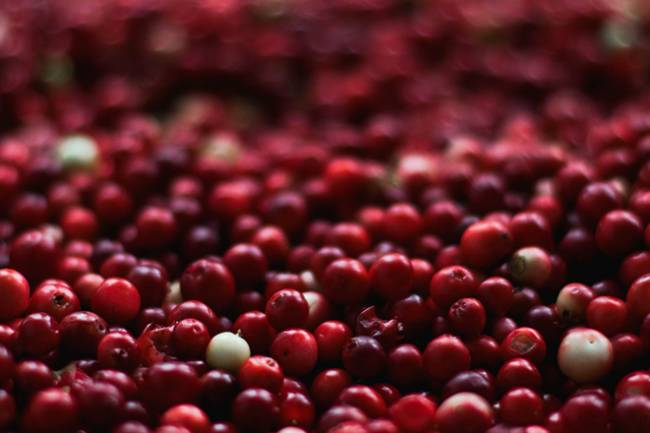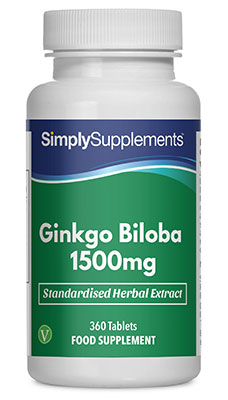Health Benefits of Ginkgo Biloba

Ginkgo biloba is sometimes known as the Maidenhair Tree. It is considered by many to be a “living fossil” as archaeologists have found evidence of it growing for over 200 million years.
Ginkgo is one of the world’s most popular herbal supplements, having been used for generations. According to statistics collected in the early 2000’s it is considered to be the fourth best-selling medicinal plant in the USA, with approximately 4.5 million people taking it per week.
Closer to home, Ginkgo is often prescribed by doctors in Germany, where it is considered a bona fide treatment for a range of medical conditions, most commonly those pertaining to symptoms of dementia such as memory loss and general loss of mental acuity.
Benefits of Ginkgo
Ginkgo biloba’s primary method of action seems to be its effect on the circulatory system. Studies suggest that in suitable volumes the active ingredients found in Ginkgo cause an increase in blood viscosity. This, in turn, can increase blood flow, particularly through smaller so-called “micro-vessels”.
Alongside this, some evidence exists that Ginkgo may also dilate blood vessels, particularly in the brain and the peripheral organs. The beneficial impact of Ginkgo is believed to stem from this improved circulation of blood, which ensures a stronger flow of nutrients to organs or cells that may otherwise behave sub-optimally.
In one study a group of volunteers agreed to have their circulatory rate, heartbeat and blood pressure monitored while taking a Ginkgo supplement. The researchers observed that blood flow was “significantly higher during active treatment” whilst blood pressure remained unchanged.
This evidence seems to support the theory that Ginkgo biloba’s primary method of action is to increase the nutrients circulating around the body without impacting the heart muscle.
Here are some of the key health benefits that many people attribute to Ginkgo:
Mental Acuity
 Ginkgo is sometimes referred to as a “nootropic” or a “cognitive enhancer”. This is due to the impact on cognitive ability that many people experience after taking Ginkgo.
Ginkgo is sometimes referred to as a “nootropic” or a “cognitive enhancer”. This is due to the impact on cognitive ability that many people experience after taking Ginkgo.
In one study patients were prescribed either 40mg of ginkgo or a placebo, to take three times a day. After a period of 12 weeks the volunteers underwent a barrage of tests designed to measure their cognitive function. The researchers reported that at the end the group taking Ginkgo extract experienced a “beneficial effect on cognitive function”.
Another experiment aimed to assess how the strength of Ginkgo taken impacts cognitive performance. Participants received either 120mg, 240mg or 360mg of ginkgo extract, then underwent repeat testing over the next six hours.
They reported “a number of significant changes on the performance measures” with the “most striking” following dosing of 240mg or greater. Apparently this beneficial effect began to appear just a few hours after initial dosing and the impact continued past the 6 hour threshold of the experiment.
This work was further expanded by another group of scientists who provided either single daily doses or multiple doses throughout the day. This meant that different volunteers received varying volumes of the active ingredient. Psychometric testing was carried out regularly for an eleven hour period after the first dose was given. The experts then crunched the data to see what impact different timing and dosages had on test scores.
The most obvious improvements shown by participants were on memory, and they found this effect to be dose-dependent. They also noted that older individuals tended to benefit more than younger ones.
Another study provided participants with either 120mg, 240mg or 600mg of ginkgo just one hour before they were subjected to testing. While the placebo group saw no improvement (as should be expected) the Ginkgo group taking 600mg exhibited results that were “very significantly improved”.
These studies underline the fact that Ginkgo seems to exhibit a dose-dependent effect. Higher concentrations of Ginkgo result in greater improvements, especially in the short term. On the other hand, with patience even far more moderate doses can show beneficial impacts after four to six weeks of treatment.
Dementia
Dementia is associated with a decline in cognitive function. Furthermore, research suggests that a major cause of these symptoms arises as a result of reduced circulation in the brain. These findings, combined with the research highlighting Ginkgo’s impact on cognitive ability, suggest that it may also offer benefits to dementia patients.
One of the most extensive studies looking at the effect of Ginkgo on dementia involved approximately 1,200 patients, each of whom were offered Ginkgo extract on a daily basis. While the active ingredient took time to show beneficial impacts, some four to six weeks later significant improvements started to be experienced. Indeed, the report highlights greater memory, concentration and alertness, with Ginkgo leading to a 25% improvement in cognitive symptoms of dementia on average.
A meta-analysis involves the collation of numerous previous experimental results to look for general patterns. Just such a process was carried out on the impact of Ginkgo on the symptoms of dementia. The report summarized their conclusions that “Ginkgo biloba appears as a useful and sensible supplementary medication to treat Alzheimer’s disease”. Furthermore, they stated that “it seems to be a synthesis of all the different profiles of action of the various, commonly used drugs but with less [sic] side effects”.
Perhaps this is why Gingko has been available in Germany, having been approved since 2004 by the German Health Authority for the treatment of primary degenerative dementia.
Cardiovascular Health
 One of the greatest sources of mortality in the West is cardiovascular disease (CVD). While CVD can have a number of causes, one of the most common is known as “atherosclerosis”. Here the blood vessels narrow as a result of inflammation or an internal coating (such as in response to high cholesterol levels). In severe cases blood may fail to continue its passage
One of the greatest sources of mortality in the West is cardiovascular disease (CVD). While CVD can have a number of causes, one of the most common is known as “atherosclerosis”. Here the blood vessels narrow as a result of inflammation or an internal coating (such as in response to high cholesterol levels). In severe cases blood may fail to continue its passage
along the vessel, or may begin to “clump”. This can lead to heart attacks or stroke.
At the same time, Ginkgo is recognised for its ability to alter blood viscosity. Scientists wondered, therefore, whether Ginkgo may have an impact on certain risk factors associated with the onset of atherosclerosis.
Their research suggests that cells taken from human blood vessels reduced their “stickiness” after treatment with Ginkgo biloba. This means that plaque is less likely to form inside blood vessels, reducing the chances of blood clots. Concluding, they stated that “Ginkgo biloba may have potential implications in clinical atherosclerosis disease”.
Raynaud’s Disease
Raynaud's is a surprisingly common yet highly uncomfortable condition. Raynaud's seems to affect the tiny blood vessels that run beneath the skin, particularly in the arms and hands. The condition affects the diameter of these blood vessels, causing them to spontaneously expand or contract. This, in turn, can lead to discolouration of the skin, burning sensations, discomfort and problems with motion.
There is growing evidence, however, that Ginkgo’s impact on the circulatory system may have a role to play in easing the uncomfortable symptoms experienced by Raynaud's sufferers.
One notable study provided Raynaud's sufferers with either a Ginkgo supplement or a placebo for a period of ten weeks. Volunteers were asked to keep a journal of the attacks they experienced. Whilst there were no changes to either the severity or duration of attacks, the frequency declined dramatically. On average participants taking the ginkgo supplement experienced a 56% reduction in symptoms during the test.
This is an incredible improvement and should give Raynaud’s sufferers cause for hope that a suitable treatment may be just round the corner.
PMS
Some people believe that symptoms experienced as PMS may have a circulatory element, and so it follows that Ginkgo biloba may have an impact by altering blood consistency.
An interesting study from Tehran took place over a six month period, in which 90 female students took either Ginkgo or a placebo. In terms of dosage, participants were provided with 40mg of ginkgo three times a day from the 16th day of the menstrual cycle to the 5th day after the next cycle. Throughout volunteers were asked to keep records on their PMS symptoms.
The Ginkgo group reported a 24% improvement in symptoms, compared to just 9% of those taking the placebo. Even ruling out the placebo effect the results of this experiment indicate that Ginkgo may serve a useful purpose for reducing the severity of PMS.
How Much Ginkgo Should I Take?
 Research suggests that the beneficial impacts of Ginkgo are “dose dependent” - in other words the higher concentration consumed the greater or the more rapid improvements are likely to be.
Research suggests that the beneficial impacts of Ginkgo are “dose dependent” - in other words the higher concentration consumed the greater or the more rapid improvements are likely to be.
Most scientific studies to date have shown positive results with doses of between 120 and 600mg, though our own super-strength Ginkgo supplement offers an incredible 3000mg of Ginkgo in each tablet.
Side Effects of Taking Ginkgo
Ginkgo seems to work by thinning the blood, so care should be taken with dosing. Furthermore, if you suffer from any condition that affects the circulatory system, or take prescription medications that impact the blood, then additional caution should be exercised. If you are in any doubt at all then it is worth seeking the advice of your doctor.
It has been suggested that individuals taking anticoagulants or blood thinners like warfarin should avoid the use of Ginkgo, as the two may interact with one another. Note that some experts believe this warning should extend to the use of aspirin, which can also have an impact on blood viscosity.
Anyone who is allergic to plants with alkylphenols, such as poison ivy, should avoid Ginkgo biloba altogether.
Women are not advised to take Ginkgo during pregnancy or breastfeeding due to insufficient evidence regarding its safety at this time.
There is some evidence to suggest that Ginkgo may interact with epilepsy and affect seizures. For this reason, epilepsy sufferers are likely wise to avoid taking Ginkgo without suitable medical supervision.
Potential side effects can vary widely based on a number of factors. Most are quite mild and may include diarrhoea, stomach upsets and headaches. Under such circumstances the evidence suggests that symptoms normally subside soon after treatment is halted.
Lastly, note that as Ginkgo may thin the blood, there is evidence that cuts may take longer to stop bleeding after supplementation. Do not take Ginkgo biloba for up to 48 hours before surgery as it may increase the risk of bleeding.
Shop for Ginkgo supplements here.

Sources:
http://www.tandfonline.com/doi/abs/10.1080/00926239808404927
http://www.sciencedirect.com/science/article/pii/S0003999300900522
http://www.nejm.org/doi/full/10.1056/nejm199704103361518#t=article
https://link.springer.com/article/10.2165/00044011-199917040-00006
http://www.tandfonline.com/doi/abs/10.1185/03007999109111504
https://link.springer.com/article/10.1007/s002130000501
https://academic.oup.com/ageing/article/30/6/523/40019
http://www.sciencedirect.com/science/article/pii/S0367326X0800124X
http://atvb.ahajournals.org/content/23/9/1559.short
http://europepmc.org/abstract/med/12396071
http://onlinelibrary.wiley.com/doi/10.1111/j.1525-1497.2005.0121.x/full
http://europepmc.org/abstract/med/10178638
https://link.springer.com/chapter/10.1007/978-3-642-73686-5_36
https://search.proquest.com/openview/215c18fa346f22614d4062c265f15f0b/1?pq-origsite=gscholar&cbl=35891
http://journals.sagepub.com/doi/abs/10.1191/1358863x02vm455oa
http://onlinelibrary.wiley.com/doi/10.1046/j.1475-097X.2002.00445.x/full
http://online.liebertpub.com/doi/abs/10.1089/acm.2008.0493

 Nicole
Nicole 

























